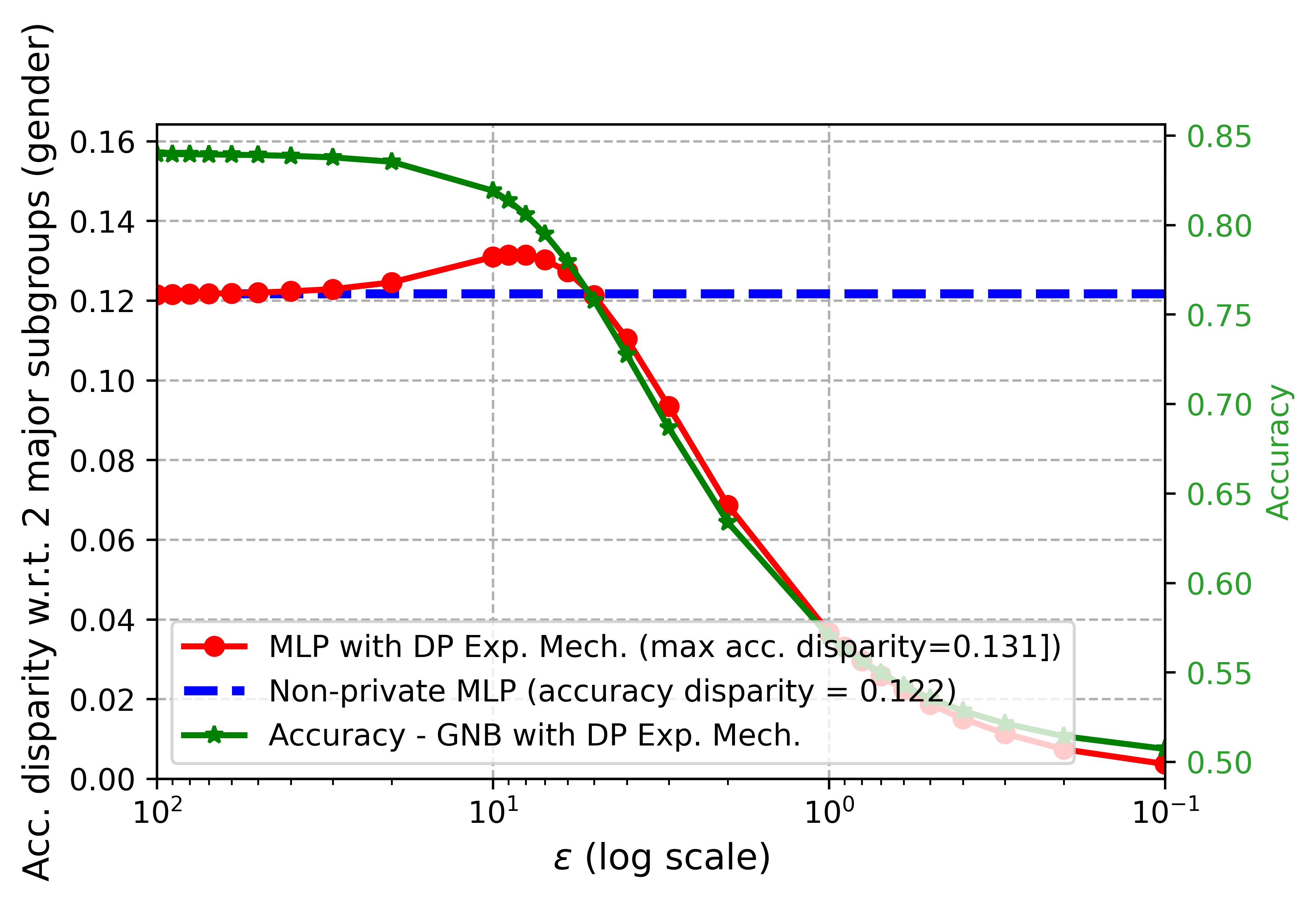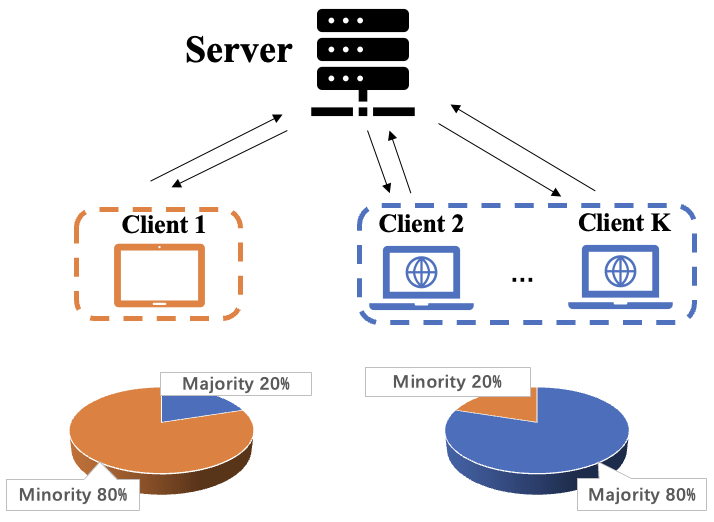A Systematic and Formal Study of the Impact of Local Differential Privacy on Fairness: Preliminary Results
2405.14725

0
0
🤷
Abstract
Machine learning (ML) algorithms rely primarily on the availability of training data, and, depending on the domain, these data may include sensitive information about the data providers, thus leading to significant privacy issues. Differential privacy (DP) is the predominant solution for privacy-preserving ML, and the local model of DP is the preferred choice when the server or the data collector are not trusted. Recent experimental studies have shown that local DP can impact ML prediction for different subgroups of individuals, thus affecting fair decision-making. However, the results are conflicting in the sense that some studies show a positive impact of privacy on fairness while others show a negative one. In this work, we conduct a systematic and formal study of the effect of local DP on fairness. Specifically, we perform a quantitative study of how the fairness of the decisions made by the ML model changes under local DP for different levels of privacy and data distributions. In particular, we provide bounds in terms of the joint distributions and the privacy level, delimiting the extent to which local DP can impact the fairness of the model. We characterize the cases in which privacy reduces discrimination and those with the opposite effect. We validate our theoretical findings on synthetic and real-world datasets. Our results are preliminary in the sense that, for now, we study only the case of one sensitive attribute, and only statistical disparity, conditional statistical disparity, and equal opportunity difference.
Create account to get full access
Overview
- The paper explores the impact of local differential privacy (DP) on the fairness of machine learning (ML) models
- Local DP is a privacy-preserving technique where data is perturbed before being shared with the model trainer
- The study examines how different levels of local DP affect statistical disparity, conditional statistical disparity, and equal opportunity difference across subgroups
- The authors provide theoretical bounds on the extent to which local DP can impact model fairness, and validate their findings on synthetic and real-world datasets
Plain English Explanation
Machine learning algorithms often rely on data that contains sensitive information about individuals. To protect privacy, a technique called differential privacy can be used to add noise to the data before it's used for training. This "local" version of differential privacy is preferred when the data collector cannot be fully trusted.
However, recent studies have shown that local differential privacy can impact the fairness of the resulting ML models, sometimes improving fairness and other times reducing it. This paper takes a closer look at this relationship between privacy and fairness.
The researchers conducted a systematic study to understand how different levels of local differential privacy affect various fairness metrics, such as statistical disparity, conditional statistical disparity, and equal opportunity difference. They provide mathematical bounds that explain when privacy can improve fairness and when it can make it worse.
The authors validate their theoretical findings using both synthetic and real-world datasets. While the current study only looks at a single sensitive attribute, the insights provide a valuable foundation for understanding the tradeoffs between privacy and fairness in machine learning.
Technical Explanation
The paper presents a formal analysis of the impact of local differential privacy (DP) on the fairness of machine learning models. The researchers consider three fairness metrics: statistical disparity, conditional statistical disparity, and equal opportunity difference.
Through theoretical analysis, the authors derive bounds on how these fairness metrics change as the level of local DP is increased. They characterize the conditions under which local DP can improve fairness (by reducing discrimination) and the cases where it can have the opposite effect.
To validate their findings, the researchers conducted experiments on both synthetic and real-world datasets. The results confirm the theoretical predictions, showing that the impact of local DP on fairness can vary depending on factors such as the data distribution and the specific fairness metric being used.
The paper's analysis provides a deeper understanding of the complex relationship between privacy and fairness in machine learning. By quantifying the tradeoffs, the work lays the groundwork for developing techniques that can simultaneously achieve high levels of privacy and fairness.
Critical Analysis
The paper makes an important contribution by rigorously studying the interplay between local differential privacy and model fairness. The theoretical bounds and empirical validation offer valuable insights into the nuanced relationship between these two important considerations in machine learning.
One limitation of the current study is that it only examines a single sensitive attribute. Future research could explore the impact of local DP on fairness metrics that involve multiple sensitive attributes, as real-world applications often need to consider intersectionality. Additionally, the paper focuses on statistical notions of fairness, but other fairness frameworks, such as those based on causal inference or individual fairness, could provide additional insights.
Another area for further investigation is the interplay between local DP, fairness, and other machine learning objectives, such as model accuracy. The paper's findings suggest that privacy-preserving techniques can have complex effects on fairness, and it would be valuable to understand how these tradeoffs scale in more realistic settings.
Overall, this work represents an important step forward in understanding the nuanced relationship between privacy and fairness in machine learning. The insights provided can help guide the development of techniques that can effectively balance these competing priorities.
Conclusion
This paper presents a systematic study of the impact of local differential privacy on the fairness of machine learning models. Through theoretical analysis and empirical validation, the authors demonstrate that the relationship between privacy and fairness is complex and can vary depending on the specific fairness metric and data distribution.
The findings provide valuable insights for researchers and practitioners working to develop machine learning systems that are both privacy-preserving and fair. By quantifying the tradeoffs, the work lays the groundwork for the design of techniques that can simultaneously achieve high levels of privacy and fairness, which is crucial for the responsible deployment of ML in sensitive domains.
While the current study has some limitations, it represents an important step forward in understanding the interplay between these two critical properties of machine learning. The insights offered can inform future research and help guide the development of ethical and trustworthy AI systems that respect individual privacy while making fair decisions.
This summary was produced with help from an AI and may contain inaccuracies - check out the links to read the original source documents!
Related Papers

Privacy at a Price: Exploring its Dual Impact on AI Fairness
Mengmeng Yang, Ming Ding, Youyang Qu, Wei Ni, David Smith, Thierry Rakotoarivelo

0
0
The worldwide adoption of machine learning (ML) and deep learning models, particularly in critical sectors, such as healthcare and finance, presents substantial challenges in maintaining individual privacy and fairness. These two elements are vital to a trustworthy environment for learning systems. While numerous studies have concentrated on protecting individual privacy through differential privacy (DP) mechanisms, emerging research indicates that differential privacy in machine learning models can unequally impact separate demographic subgroups regarding prediction accuracy. This leads to a fairness concern, and manifests as biased performance. Although the prevailing view is that enhancing privacy intensifies fairness disparities, a smaller, yet significant, subset of research suggests the opposite view. In this article, with extensive evaluation results, we demonstrate that the impact of differential privacy on fairness is not monotonous. Instead, we observe that the accuracy disparity initially grows as more DP noise (enhanced privacy) is added to the ML process, but subsequently diminishes at higher privacy levels with even more noise. Moreover, implementing gradient clipping in the differentially private stochastic gradient descent ML method can mitigate the negative impact of DP noise on fairness. This mitigation is achieved by moderating the disparity growth through a lower clipping threshold.
4/16/2024

Learning with User-Level Local Differential Privacy
Puning Zhao, Li Shen, Rongfei Fan, Qingming Li, Huiwen Wu, Jiafei Wu, Zhe Liu

0
0
User-level privacy is important in distributed systems. Previous research primarily focuses on the central model, while the local models have received much less attention. Under the central model, user-level DP is strictly stronger than the item-level one. However, under the local model, the relationship between user-level and item-level LDP becomes more complex, thus the analysis is crucially different. In this paper, we first analyze the mean estimation problem and then apply it to stochastic optimization, classification, and regression. In particular, we propose adaptive strategies to achieve optimal performance at all privacy levels. Moreover, we also obtain information-theoretic lower bounds, which show that the proposed methods are minimax optimal up to logarithmic factors. Unlike the central DP model, where user-level DP always leads to slower convergence, our result shows that under the local model, the convergence rates are nearly the same between user-level and item-level cases for distributions with bounded support. For heavy-tailed distributions, the user-level rate is even faster than the item-level one.
5/28/2024

On the Inductive Biases of Demographic Parity-based Fair Learning Algorithms
Haoyu Lei, Amin Gohari, Farzan Farnia

0
0
Fair supervised learning algorithms assigning labels with little dependence on a sensitive attribute have attracted great attention in the machine learning community. While the demographic parity (DP) notion has been frequently used to measure a model's fairness in training fair classifiers, several studies in the literature suggest potential impacts of enforcing DP in fair learning algorithms. In this work, we analytically study the effect of standard DP-based regularization methods on the conditional distribution of the predicted label given the sensitive attribute. Our analysis shows that an imbalanced training dataset with a non-uniform distribution of the sensitive attribute could lead to a classification rule biased toward the sensitive attribute outcome holding the majority of training data. To control such inductive biases in DP-based fair learning, we propose a sensitive attribute-based distributionally robust optimization (SA-DRO) method improving robustness against the marginal distribution of the sensitive attribute. Finally, we present several numerical results on the application of DP-based learning methods to standard centralized and distributed learning problems. The empirical findings support our theoretical results on the inductive biases in DP-based fair learning algorithms and the debiasing effects of the proposed SA-DRO method.
6/21/2024
↗️
Causal Discovery Under Local Privacy
R=uta Binkyt.e, Carlos Pinz'on, Szilvia Lesty'an, Kangsoo Jung, H'eber H. Arcolezi, Catuscia Palamidessi

0
0
Differential privacy is a widely adopted framework designed to safeguard the sensitive information of data providers within a data set. It is based on the application of controlled noise at the interface between the server that stores and processes the data, and the data consumers. Local differential privacy is a variant that allows data providers to apply the privatization mechanism themselves on their data individually. Therefore it provides protection also in contexts in which the server, or even the data collector, cannot be trusted. The introduction of noise, however, inevitably affects the utility of the data, particularly by distorting the correlations between individual data components. This distortion can prove detrimental to tasks such as causal discovery. In this paper, we consider various well-known locally differentially private mechanisms and compare the trade-off between the privacy they provide, and the accuracy of the causal structure produced by algorithms for causal learning when applied to data obfuscated by these mechanisms. Our analysis yields valuable insights for selecting appropriate local differentially private protocols for causal discovery tasks. We foresee that our findings will aid researchers and practitioners in conducting locally private causal discovery.
5/6/2024